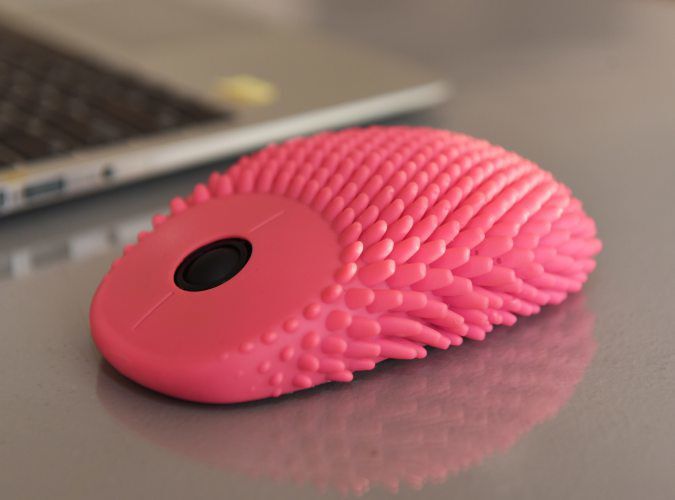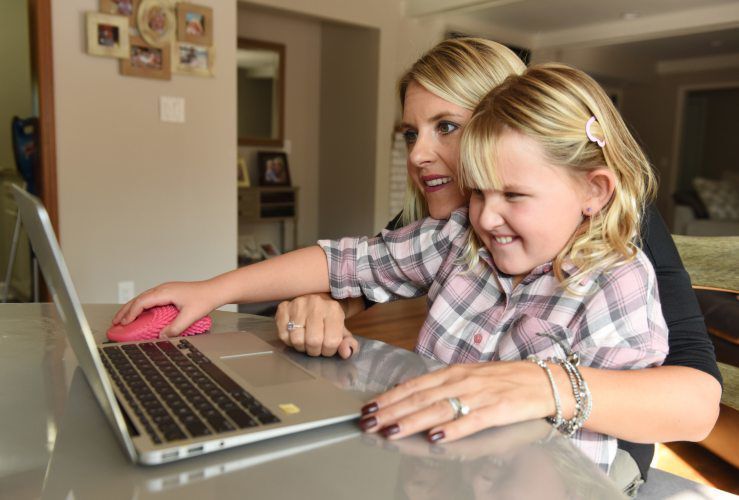Navigating on a computer with a traditional mouse never came easy for 8-year-old Isabelle Dapkus, who has developmental disabilities.
Isabelle struggles with fine motor skills, which affects her ability to use online materials for virtual learning, said her mother, Julia Dapkus.
However, after countless moments of frustration, Isabelle is now able to access her schoolwork and scroll through YouTube on her own, all thanks to a fidget mouse — a tactile, multi-sensory device that resembles a toy.
“She’s never been able to use a mouse before, like ever, and it wasn’t for lack of trying, but it was just not the appropriate tool,” said Dapkus, 41, of Livonia, Mich. “The first time she was exposed to it, she took right to it and shrieked with the delight because it was hot pink.”
As virtual learning has become a common option for families during the COVID-19 pandemic, online schooling has become a struggle for students with developmental disabilities, especially as access to autism centers and in-person therapy has become limited.
Enter the hoglet, a learning tool created by a Michigan company to help students like Isabelle focus on computer tasks and navigate online lessons with little or no help.
The hoglet — which takes its name from its resemblance to a baby hedgehog — is specially designed with elements from a fidget toy to increase focus for those with developmental disabilities and autism spectrum disorders.
“The cool thing about our products is that they don’t exist currently. This is a device for anyone who learns differently and anyone who needs to fidget, no matter their age, no matter where they’re from,” said Parker Lynch, creator of the Hoglet and CEO of HedgeHog Health. “I had this idea far before COVID, but I think in a time of need like this, there’s no more relevant time for a product like this to come out.”
The multi-sensory fidget mouse is covered in a silicon body with nubs all around it that help children grip the device. The hoglet is wireless and minimizes clicking sounds as to not irritate those with autism spectrum disorder.
Parker met Dapkus at a fundraiser for a nonprofit the Livonia woman runs to help special needs families, and he eventually asked her and her daughter to test the mouse out.
Children who use a fidget device have an increase in concentration, are not as restless and more likely to complete therapeutic and educational tasks, according to a study.
The Flushing Hospital Medical Center in New York, which performed the study, found that fidget toys can be beneficial for all students, including those with learning disabilities. The study showed a 10% increase in academic scores of students who used fidget toys and a 27% increase in scores of students diagnosed with ADHD.
Because of research of his own that saw similar results, Lynch decided to create a tool similar to fidget toys that could provide the same functionality.
“There’s clinical studies that show that when you fidget, it helps you increase focus for at least some people,” he said. “There’s so many learning devices out there, but they’re not really available for kids in school.”
Lynch has a dual master’s in early childhood education and special education from New York University and spent 10 years as a teacher. During his first teaching job, Lynch noticed a student carried a fidget toy around the school, and when the boy wasn’t allowed to have the fidget toy in the computer lab, he was not focused.
Lynch took it upon himself to bring the student a fidget toy in the computer lab and saw the student concentrated during the entire assignment while using it.
Five years of research and testing later, Lynch founded HedgeHog Health and patented the company’s first product, the hoglet.
“There’s no substitute for the actual classroom so we intend on being a supplemental service,” he said. “So if you can get into the autism center, we think you should still go there too.”
The Hoglet will go on sale in December, though pre-orders can be made now. The company has been able to raise about $70,000 for production.
Lynch and HedgeHog Health are working on a removable and washable cover for the hoglet as well as another mouse that will stimulate all five senses.
“I think the hoglet is so universal the special needs community is hit hard with this shutdown ending our resources. Our support was just stripped away immediately, and kids regress,” Dapkus said.
Dapkus’ nonprofit, Communication Is Key, provides resources for communities and families to help those with complex communication needs such as Isabelle, who is a complex, multimodal communicator.
The nonprofit provides grants for schools and parks to build play stations with alternative communication tools, plus and scholarships and course giveaways for parents to be trained on how to deal with their children.
“People who have neurotypical kids don’t appreciate the basics of everyday living that our kids work so hard for,” she said.
Ariana Taylor writes for the Detroit News.



